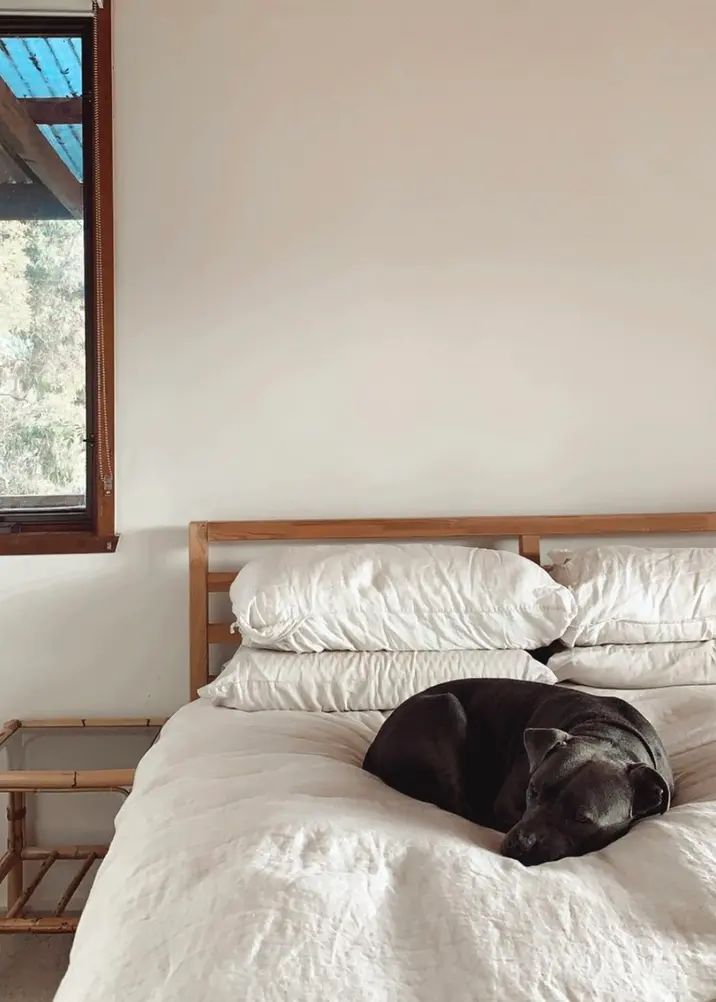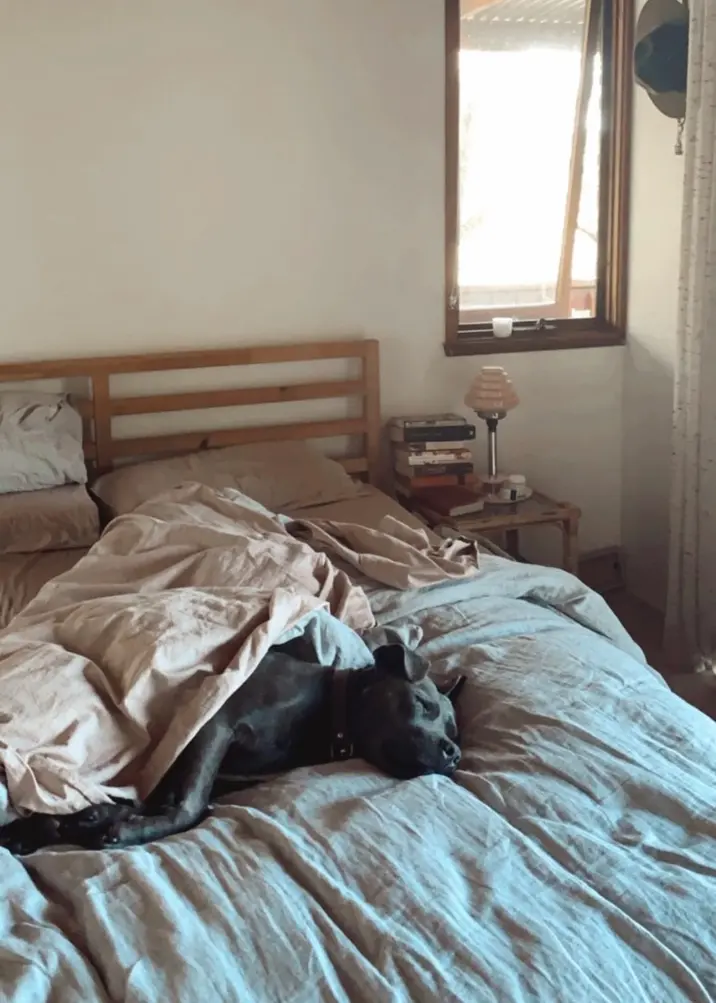
Is It Bad to Sleep With Your Pet? We Asked an Expert
Because nobody wants a ruff night’s sleep.
Most of us would do anything for our pets. Even though they don’t pay rent, they’re great listeners, they give the best “hugs”, and they bring loads of joy to our lives. Because of this, we do a lot for them. We clean up after them, feed them, walk them, wash them, throw birthday parties for them, and of course, we let them sleep in bed with us.
Nothing beats the warm and fuzzy feeling you get when your pet hops into bed with you. It’s like having a plush teddy bear snuggling you… – except it breathes, moves, barks, and scratches. And as much as we love having our furry friends in bed with us, there are times when it can become bothersome for both you and your pet.
There are nights you don’t want them in there at all (which is ironically when your bed is the only place they want to be). There are other nights when you’re feeling lonely and all you want is a big old snuggle – and they’re nowhere to be found!
But is this good for them? If we make them sleep separately, does it leave them feeling unwanted and unloved? And what is it doing to our sleep?

However, there are ways to avoid a restless pet. According to Dr Bruce, “a good evening routine including set walk times, meal times, and toilet times can help to alleviate potential interruptions overnight." She also stresses bedding is unfortunately not immune to muddy paws and potential accidents that may happen on the bed – so be prepared to do some extra loads of washing!
It’s also important to consider your pet’s personality and behavioural needs. “Providing a safe space that is uniquely theirs, such as a crate or comfortable bed on the floor can actually provide your pet with a sense of comfort and security, and allow them a better sleep,” says Dr Bruce.

"Personally, as a vet, pets are my family, and are extremely spoiled in my household! We bought a king size bed just to ensure we had enough room for our 30kg pup to fit. Even so, our girl still preferences her own bed on the floor as she gets uninterrupted sleep and all the space she needs." - Dr Kate Bruce
On the other hand, there are lots of benefits to having your pet sleep on or in your bed! Australia’s leading sleep expert Olivia Arezzollo shared with us the positive mental impact a pet sleeping in your bed can have – especially for those who suffer from anxiety. “Pets can reduce anxiety and therefore improve sleep,” Arezzollo says. Dr Bruce also says having your four-legged friend in your bed “fosters a stronger relationship between an owner and their pet.”
We’ve put together a list of pros and cons of having your furbaby bunk with you to help you with the difficult decision of whether or not they should be taking up prime real estate in your bed at night.
Pros
1. Strengthens your bond
By inviting your pet to share your bed with you, you’re showing them they are trusted, and they can trust you, “It can take time for a pet to build trust with humans, and sharing a bed is a great sign of mutual love and respect,” shares Dr Bruce.
2. Makes you both feel safe
Inviting your pet to sleep in your bed will allow both you and your pet to feel secure while you sleep. “Some recent studies have shown that pets on the bed can actually improve sleep by providing a sense of security and comfort, especially amongst women,” according to Dr Bruce.
3. Releases dopamine for both of you
Often referred to as the ‘happy drug’ dopamine is a natural hormone which is released in your body when you experience joy. Dopamine in both you and your pets brain is released when you are around each other, which is the perfect way to end your day before nodding off to sleep.
Cons
1. Disrupt your sleep
While this is more of an issue for owners with pets on the larger side, having an animal in your bed throughout the night increases your chances of being woken up. Similar to humans, animals toss and turn when they sleep, so if you’re both prone to moving throughout the night sleep expert Olivia Arrezolo suggests sleeping in different beds.
2. Aggravate allergies
Not all of us are blessed with the ability to cuddle a dog or cat and not have some sort of allergic reaction after. For those who do suffer from pet hair allergies, we suggest making your bed a pet-free zone, so you can sleep without needing to wake up and take an antihistamine every three hours.
3. Potential exposure to dirt and bugs
“Fresh linen is unfortunately not immune to muddy paws, licky tongues, and potential accidents on the bed,” shares Dr Kate Bruce, so if you do choose to have your pet bunk with you for the night, try to make sure they’re nice and clean before they jump in. “Don’t forget to also make sure your pet is up to date with all their parasite prevention so you’re not sharing your bed with any other creepy crawly friends!” she adds.
"Occasionally some pets with possessive or dominant tendencies may show aggression when removed from their humans’ bed. This behaviour needs to be addressed immediately to avoid a family member getting bitten by a pet who doesn’t understand that the bed is not theirs to guard," shares Dr Bruce. If your pet is showing possesive or dominant tendicies please contact your local vet.
For more from Dr Kate Bruce, follow her @kate.the.vet
Enjoyed This?
Improve your sleep health.









